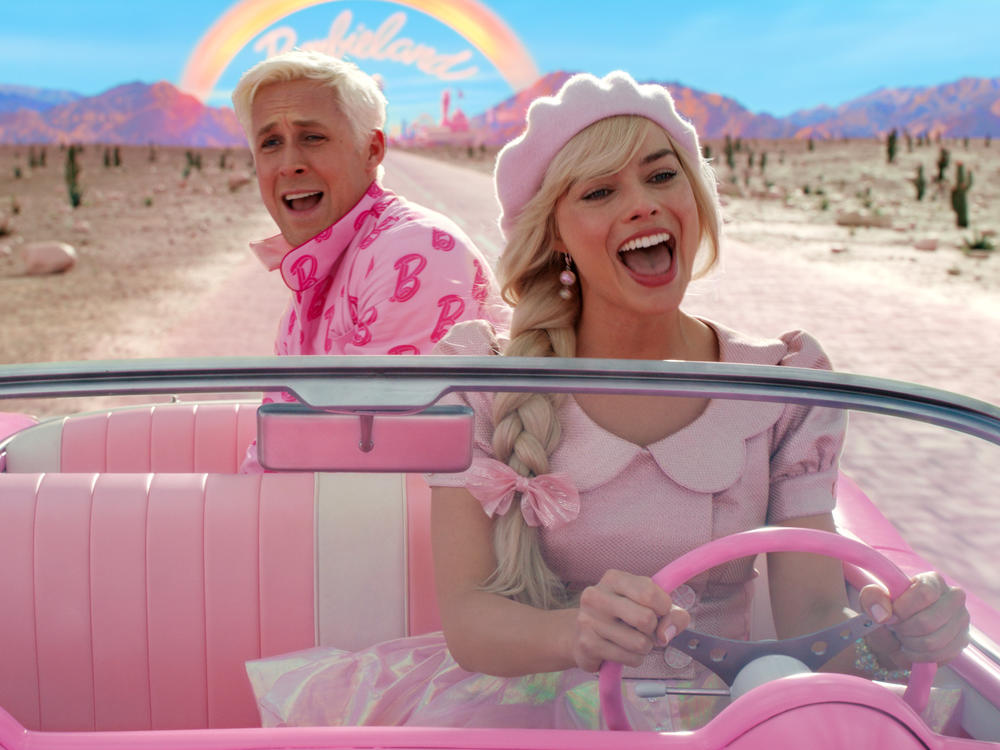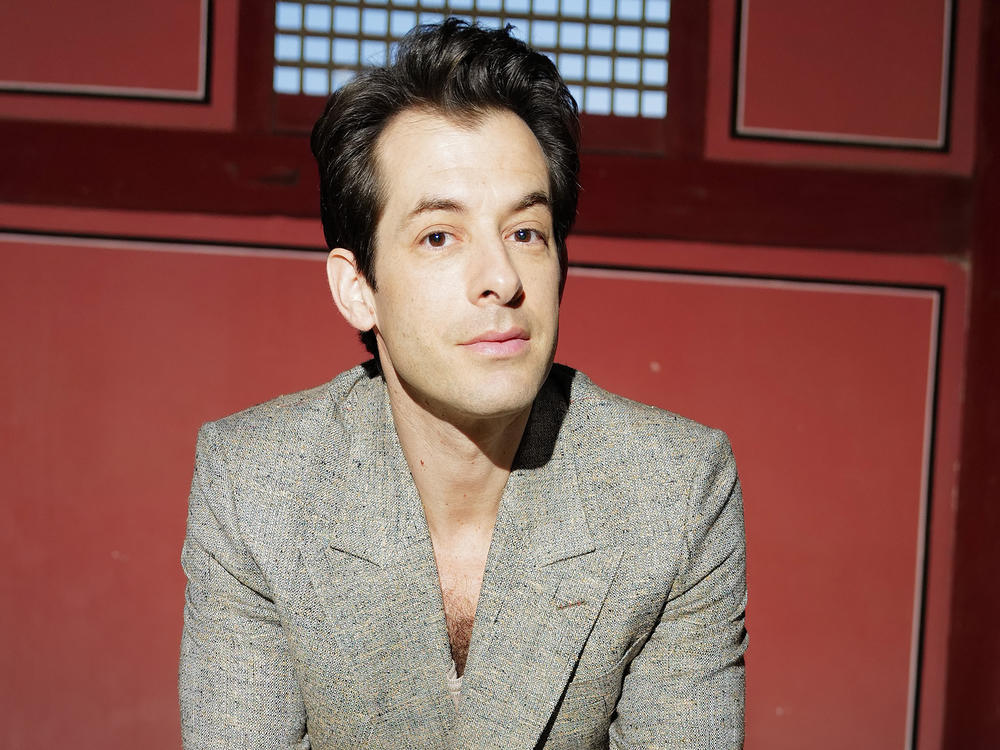Section Branding
Header Content
'Barbie' music producer Mark Ronson opens up about the film's 'bespoke' sound
Primary Content
Mark Ronson isn't new to this music thing: The hitmaking producer already had several Grammys and an Oscar to his name when he signed on to produce the soundtrack for Barbie. When the film's director, Greta Gerwig, asked if Ronson and Andrew Wyatt would score the entire film, they couldn't refuse — even though they'd never scored a film before.
"I was so inspired by this script," Ronson says. "I love the whole message of it, I love the whole idea of it. Obviously, Barbie's story is so wonderful."
What followed was a year of working with artists like Nicki Minaj, Sam Smith, Billie Eilish and PinkPantheress to conceptualize, produce and compose songs for the album. Some artists were drawn to the project because of Gerwig's previous work, others because Barbie (the doll) had played an important role in their lives. And some came because of Ronson's reputation.
Ronson and Gerwig would talk to the musicians and show them scenes from the movie to illustrate the its tone and arc. The process seemed to work; after watching an early version of Barbie's car chase scene, Charli XCX wrote "Speed Chase" for the soundtrack.
"And that's what's so great about a lot of the songs that people wrote, because they seem so bespoke," Ronson says. "It was just so wonderful to see how every artist took what they saw, took the conversation with Greta, and everyone ran with it and did something different."
Coaxing great ideas out of pop stars is familiar territory for Ronson, but his instrumental score for the film, co-composed with Wyatt, was his first such project — and he admits that making it work meant stifling some of his usual instincts.
"When you're making a pop song, you're constantly thinking of of hooks and melodies and ear candy," he says. And while all of those elements are important to the songs that made it to the soundtrack, he knew the movie's background music shouldn't be a distraction: "You're there to support the emotional undertow of the film at that moment."
Interview highlights
On how "What Was I Made For?" by Billie Eilish and Finneas became the film's emotional center
They saw the film, and I think Billie texted maybe a day or two later — like, "wrote something," with a smiley face. Such an understated thing for this wonderful song that she was about to send to us.
When we heard it, Greta and I — I think we got it at the same time — we immediately called each other like, "This song is just insane." I was basically like, "What is wrong with these kids? Why are they so good? They're so young." ... Andrew and I had been working on a lot of pieces for the more emotional moments, and some of them, oddly enough, weren't really that dissimilar to what Billie and Finneas' song was. We were like, "Wow — let's just make their song this thread that we weave through the film."
On writing the song "I'm Just Ken" (despite not being a lyrics guy)
Maybe it was because I knew Ryan Gosling was playing [Ken], so I had the advantage of picturing him saying every line as I'm reading this script, but he just got his hooks in me, that character. He's dopey, but you root for him. All he wants is just for this person to feel the same way about him that he feels about her, and that's never going to happen. I think I was walking to the studio one day, my studio in Manhattan, and "I'm just Ken / Anywhere else I'd be a 10" — it just came to me. I wasn't even thinking, at that point, I'm going to write this song by myself, or write the lyrics. I got to the piano and I found chords and a melody that I thought was good. And I sent off the demo to Greta, and she wrote back so enthusiastically. All you can ever tell is: Is it making you excited when you're in the studio?
On getting Ryan Gosling in the studio to track "I'm Just Ken"
It's awkward being with anyone in the studio for the very first time, because it's a vulnerable place. You're about to embark on this singing. You're feeling each other out. And as a producer, you're seeing [their] vocal ranges and their limits, and you always want to push them — but not too far, because if you're pushing somebody to [a] range they don't have, you can shatter their confidence and then the whole session is a wash. Add to that the fact that Ryan is a giant movie star, and he's coming here, like, one hour off from shooting this giant film. He came into the studio and we just talked for a little while. Fifteen minutes in, we're like, "OK, shall we try this?"
Because Andrew sang on the demo and he has such an amazing range, I thought, OK, let me make this a little bit easier for Ryan — lower it a key or two. As Ryan started to warm up, I was like, OK, we could kind of bump this up another key. Oh, now we can bump it [to] the original key — he's just giving this wonderful vocal performance. And also, because he's such an incredible actor, he's imbuing all these words with a different context and emotion than what Andrew and I had even been able to to add to it. It felt like he was inhabiting the song, which is really wonderful.
On being a music industry "nepo baby" thanks to his stepdad, Mick Jones of Foreigner
I think by the very definition of the term, yes, of course I'm a nepo baby. My stepdad, he's a musician. He had recording equipment around the house. I got to be inside recording studios from such a young age, where I realized, like, these were my happy places. ... So yes, the advantages that came from having my stepdad be in music, I'm sure those helped. [But] I think that when I started off DJing in hip-hop clubs in New York in the mid-'90s, my stepdad's status as a brilliant rock and roll musician and balladeer had nothing to do with what I was doing. ... I don't think anybody knew, and I don't think anybody really cared.
On his place in pop music, as he enters his late 40s
I moved from LA back to New York, and LA really is the hub and center and just be-all of the pop music industry. ... All the writers and producers, really the lion's share of people, are in LA. And I made this kind of silent agreement: I was like, I'm going back to New York and I'm not going to be in the thick of it anymore. I'm not going to be worried about being on everybody's record and doing these cool projects. I'm just going to do things that I love, and also thinking that maybe I'm — hopefully gracefully — bowing out of pop music.
I came back to New York, and one of the first things that came about when I was back here was working on the Barbie thing. And it's funny, the Dua Lipa song "Dance the Night," every time I turn on the radio it's on — and it's a bop, it's a banger. I guess I thought maybe I was done, or maybe pop music was done with me. I get so excited by young producers and the sound of what's happening in pop, [but] any time I try to chase that, it doesn't work and it feels inauthentic. But when I sort of hone into the things that I love — like songcraft, arranging and those things — that's when I feel good about it.
Lauren Krenzel and Susan Nyakundi produced and edited this interview for broadcast. Bridget Bentz, Molly Seavy-Nesper and Daoud Tyler-Ameen adapted it for the web.
Copyright 2023 Fresh Air. To see more, visit Fresh Air.


